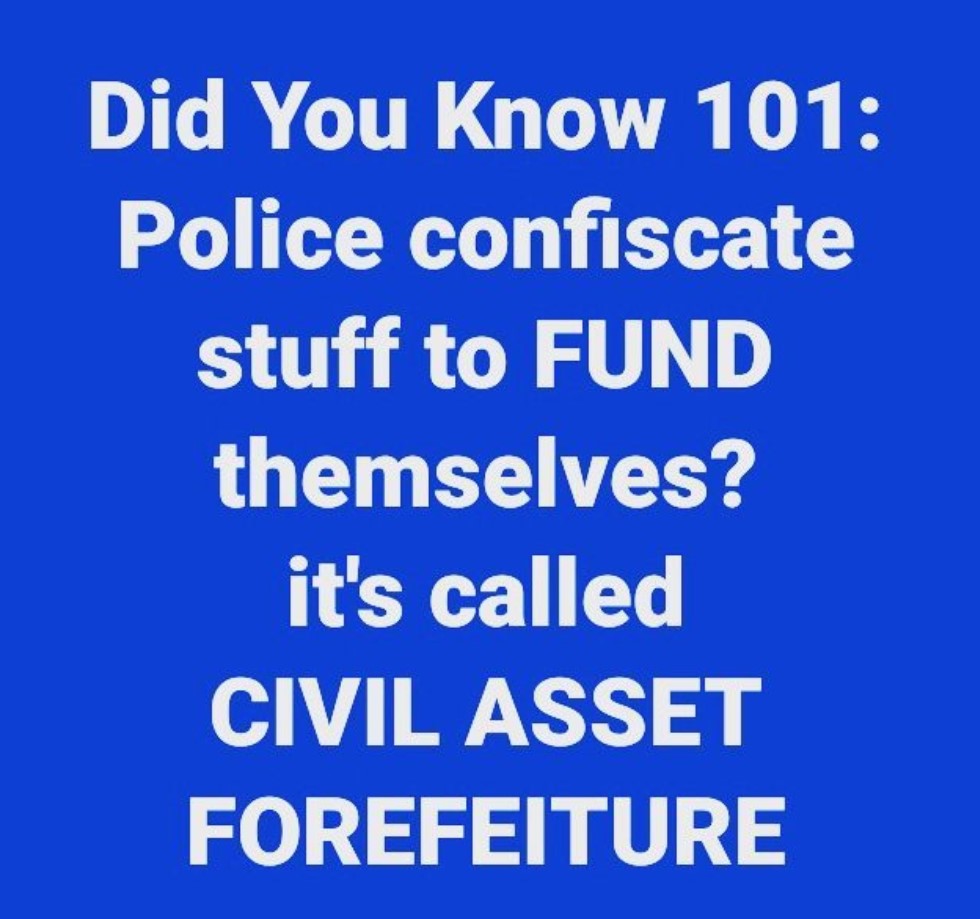How Civil Forfeiture Can Enable Public Officials’ Misuse of Funds
A fascinating story at Reason last week—about the misuse of money confiscated through civil forfeiture—illuminates the many kinds of corruption that the practice of forfeiture invites. The story breaks down a report from state auditors that shows how public officials in Georgia illegally spent millions of dollars.
Civil forfeiture is the ultimate result of a peculiar practice that law enforcement officials now participate in more and more often. Under civil forfeiture laws, police can take anyone’s property if they suspect it is related to crime—for example, trafficking in drugs or prostitution—without ever proving that a crime took place or filing criminal charges against anyone.
An office within the Georgia Department of Revenue, the Office of Special Investigations, apparently kept control of $5.3 million in forfeited revenues, even though, by law, all of that money should have gone to the state’s general fund. Then the Office illegally spent $3.1 million of that money in several peculiar ways. The Reason story provides examples of multiple levels of corruption:
Personal corruption. Some of the money that was illegally spent appears to provide little or no public benefit. Instead, it provided significant private benefits, such as engraved firearms, commemorative badges, and Fitbits, to a small group of government employees. Other expenditures made by the office were, according to auditors, “at best, questionable and would likely be deemed wasteful and unnecessary.” This class of purchases included approximately $40,000 on (non-Fitbit) fitness equipment, $321,000 on office furniture, and $800,000 on vehicles. Many of these purchases look more like luxury than necessity; for instance, the office’s purchase of a Ford F-250 Super Duty truck, which the head of the office used personally, appears completely unrelated to any job duties.
Institutional corruption. According to the auditors’ report, Joshua Waites, the head of the Office of Special Investigation, “repeatedly disregarded legal advice” and “intentionally misled” his colleagues and superiors about his civil forfeiture activities. More particularly, he bowdlerized emails he received that contained legal advice about the use of forfeiture funds. He then sent those deceptively rewritten emails to his superiors to justify his illegal use of the money. He improperly tried to use a federal program that is reserved for use against terrorists and money launderers in an attempt to get access to civilian bank accounts. Waites resigned just after the auditors’ report appeared. Shortly afterward, the state’s chief auditor revealed that Waites had claimed in his job application to falsely hold a college degree from the University of Northwest Florida, an institution that does not exist.
Constitutional corruption. As noted above, the office spent over a million dollars on office furniture, vehicles, and gym equipment. This is the kind of government spending that, on its face, is not so different from normal capital goods spending that occurs every day. At a very general level, however, if one is asked “Was this the most appropriate use of these funds?”, the correct answer is “Who can say?” The Georgia legislature, not the Office of Special Investigations, is supposed to make decisions about how public money is spent; determining how to spend public money is supposed be the legislature’s decision. Waites was supposed to transfer forfeited money and property to the state’s general fund; instead, he kept control of over $5 million in public funds and spent over half of it to benefit his office and his colleagues. That was probably fun; it was also illegal.
The Reason story provides several other examples of indefensible past uses of civil forfeiture funds by Georgia’s law enforcement officials. (I wonder how the Camden County Sheriff’s Department came to the conclusion that buying a sports car with $90,000 of forfeiture funds was really the best use of the resources it controlled.) Over time, these examples pile up. At a certain point, they raise questions about whether forfeiture-related corruption is less anecdotal than systemic.
For a broader account of the many injustices created by civil forfeiture, take a look at my recent paper on the subject.
You might also like:
Asset Forfeiture Defense Strategies for Smuggled Goods | When Innocence Does Not Help: How to Communicate about Civil Asset Forfeiture | These states let police take and keep your stuff even if you haven’t committed a crime | Bad Rules Make Bad Cops: Bart Wilson on The Economics of Civil Forfeiture | Common Myths About Asset Forfeiture Law | Yes, the government can steal your stuff | What to Do If Your Bank Account Is Frozen by the DEA | Feds seized nearly $700 million from FTX founder Bankman-Fried | Class Action Against FBI For Abusive Seizure and CIVIL FORFEITURE! Viva & Barnes HIGHLIGHT! | Over $455,000 Seized from Medical Marijuana Patient Slapped with Civil Asset Forfeiture | How To Recognize a Weak Forfeiture Case Against You | Feds seize millions in PPP funds from international ministry | Understanding the Burden of Proof in Civil Forfeiture | How Law Enforcement Decides What Assets to Seize | Asset Forfeiture Legal Resources | Hero Judge Takes on Civil Asset Forfeiture! | An Indiana man was caught with $260 of heroin. The state took his $42,000 Land Rover. | County Sheriff Slapped with Civil Forfeiture Lawsuit | $3 Million Federal Court Settlement: Philadelphia Agrees to End Civil Forfeiture | What to Do When Facing Civil Rights Violations | Appeals Court Says Feds Must Prove Their Asset Forfeiture Case! (Steve Lehto) | JUSTICE MANUAL 9-115.000 – Use And Disposition Of Seized And Forfeited Property | Forfeiture & Organized Crime: Legal Strategies | Civil Forfeiture Defense Strategies



![PrivateProperty3-1250×650[1]](https://www.rucci.law/wp-content/uploads/2023/12/PrivateProperty3-1250x6501-1.jpg)
![Figure-17[1]](https://www.rucci.law/wp-content/uploads/2023/12/Figure-171.png)
![106960205-1634196205033-gettyimages-1231874995-RUSSIA_CRYPTO[1]](https://www.rucci.law/wp-content/uploads/2023/12/106960205-1634196205033-gettyimages-1231874995-RUSSIA_CRYPTO1-scaled-1.jpeg)
![854081161001_5616033620001_5616024865001-vs[1]](https://www.rucci.law/wp-content/uploads/2023/12/854081161001_5616033620001_5616024865001-vs1.jpg)

![gerado-serrano-tx-eagle-pass-DRW_5061-scaled[1]](https://www.rucci.law/wp-content/uploads/2023/12/gerado-serrano-tx-eagle-pass-DRW_5061-scaled1.jpg)
![original[1]](https://www.rucci.law/wp-content/uploads/2023/12/original1.jpg)

